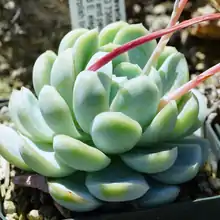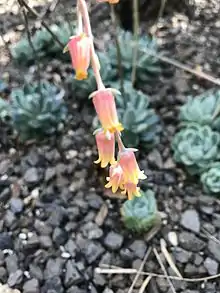| Echeveria elegans | |
|---|---|
 | |
| Scientific classification | |
| Kingdom: | Plantae |
| Clade: | Tracheophytes |
| Clade: | Angiosperms |
| Clade: | Eudicots |
| Order: | Saxifragales |
| Family: | Crassulaceae |
| Genus: | Echeveria |
| Species: | E. elegans |
| Binomial name | |
| Echeveria elegans | |
| Synonyms | |
| |
Echeveria elegans, the Mexican snow ball, God's Throne, Mexican gem or white Mexican rose is a species of flowering plant in the family Crassulaceae, native to semi-desert habitats in Mexico.
Description
Echeveria elegans is a succulent evergreen perennial growing to 5–10 cm (2–4 in) tall by 50 cm (20 in) wide, with tight rosettes of pale green-blue fleshy leaves, bearing 25 cm (10 in) long slender pink stalks of pink flowers with yellow tips in winter and spring.[3]
Cultivation
Echeveria elegans is cultivated as an ornamental plant for rock gardens planting, or as a potted plant. It thrives in subtropical climates, such as Southern California
It has gained the Royal Horticultural Society's Award of Garden Merit.[4]
Like others of its kind, it produces multiple offsets which can be separated from the parents in spring, and grown separately - hence the common name "hen and chicks", applied to several species within the genus Echeveria.[3]

Etymology
Echeveria is named for Atanasio Echeverría y Godoy, a botanical illustrator who contributed to Flora Mexicana.[5]
Elegans means 'elegant' or 'graceful'.[5]
References
- ↑ Rose, J.N. 1905. North American Flora. New York Botanical Garden 22: 22
- ↑ Rose, Bull. New York Bot. Gard. 3: 2. 1903
- 1 2 RHS A-Z encyclopedia of garden plants. United Kingdom: Dorling Kindersley. 2008. p. 1136. ISBN 978-1405332965.
- ↑ "Echeveria elegans". Royal Horticultural Society. Archived from the original on 6 June 2013. Retrieved 25 July 2013.
- 1 2 Gledhill, David (2008). "The Names of Plants". Cambridge University Press. ISBN 9780521866453 (hardback), ISBN 9780521685535 (paperback). pp. 149, 151
- Attila Kapitany, (2009). Knowing Echeverias, Cactus and Succulent Journal, Volume 81 Issue 2.